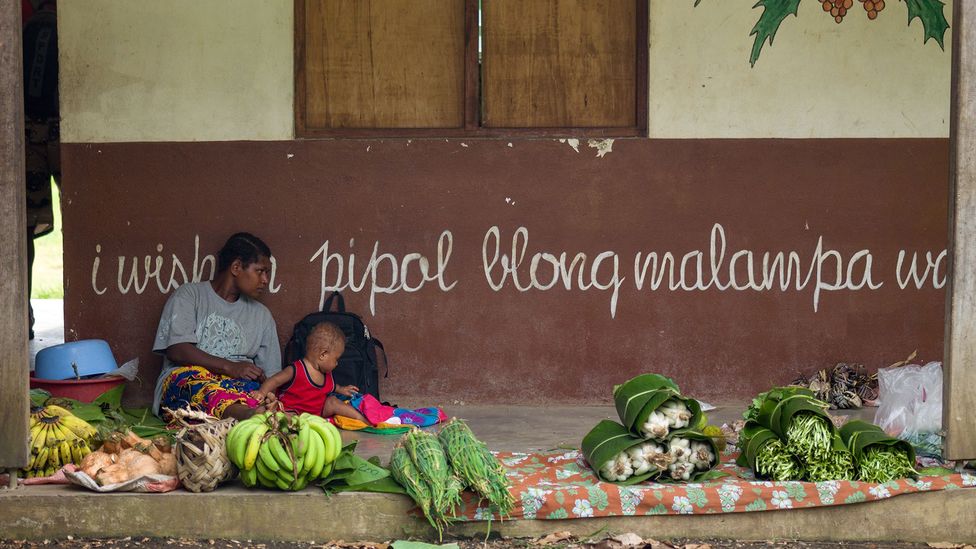Solution for: Languages of Vanuatu
Answer Table
| 1. extinct | 6. developed |
| 2. education | 7. meanings |
| 3. broken | 8. French |
| 4. plantation | 9. culture |
| 5. city | 10. preposition |
Exam Review
Languages of Vanuatu

Good morning and welcome back to the series of linguistics lectures. Today I will be talking about the language Bislama, which is a form of Pidgin English. Linguists use the term "pidgin" to describe new languages that are created by combining two or more existing languages, often in a simplified form. The study of pidgin languages is important because it provides us with information about language change and modification. The Pidgin English known as Bislama, is used in the South Pacific nation of Vanuatu, a group of islands where 81 first languages are still regularly used by the local people. There are a further 17 local languages that are in danger of dying out and eight that have been identified as extinct. This gives a total of 106 first languages and all a very high number for a small country with a population of just 200,000 people. Then thinking about foreign languages. English is the most important and has official status, largely because it is the medium for all education purposes. However, it is Bislama as the most widely spoken language in the country, used regularly by more than 90% of the population. We should note here that in earlier times some people had negative feelings towards the language. In fact, for many years it was commonly referred to as a broken language, and its use was discouraged. But attitudes have changed dramatically. And today the people of Vanuatu are very proud of this unique language. It is only when we understand the historical context that we can comprehend just why Bislama developed in Vanuatu. The first form of pidgin English in this region can be traced to around 1800 when foreign traders arrived and local people were recruited to work as sailors. On board multilingual ships, there was an obvious need for a common tongue and pidgin English was born. This early former Bislama continued to spread as trade in the Pacific developed in sandalwood and other local commodities. Then, from about 1860, a lot of people from Vanuatu traveled to Australia to work on the new plantations as laborers. Again, because of the multilingual nature of these workplaces, it was very important to have a common language. Finally, in modern times, there have been other pressures that have maintained the need for a common language. Like many other parts of the world from about the 1950s, Vanuatu experienced a significant migration of its people from small villages into the city. And it has been here that Bislama has really established itself as the country's first language. So then how can we describe the language itself ? In general terms, pidgin languages can be defined as extremely simple versions of the original language. However, this is not a satisfactory definition in this case, and linguists prefer to describe Bislama as a developed pidgin because it has more rules and ideas than most simple pidgin languages found in other parts of the world. Let's think first about the vocabulary. Because Britain was the colonial power, the majority of Bislama's vocabulary is derived from English. However, some care needs to be taken here. For example, the word "from" in Bislama can also mean "because of". So we need to be aware that words can have a wider range of meanings in Bislama. Indeed, there are numerous other potentially misleading terms. And English is not the only contributor to the vocabulary. Again, because of the region's history, there are some words around 5 to 10% that are derived from French. Then, a relatively small number of words have been taken from local Pacific languages. Usually this is the case where there is no English equivalent for naturally occurring phenomena or to describe some aspect of the culture that is unique to the country. Finally, a word about grammar. Although the vocabulary is based largely on English, it's important to note that the grammatical structure of Bislama is derived from patterns common in the local languages of Vanuatu. So for example, there are two distinct pronouns meaning "we". One means I and you, and another means I and some others, but not you. Sounds confusing in English, but in the local languages such distinctions are common. A different example concerns the word "long". It is almost the only preposition in Bislama and may be used in place of a whole range of English words such as at, to, with, on, in and so on. Well, that is the end of the formal part of the lecture. If you have any questions now, I'll be most happy to answer.
Questions 1-10
Complete the notes below.
Write ONE WORD ONLY for each answer.
Bislama - The Pidgin English Language of Vanuatu
Languages in Vanuatu
|
Local languages: |
Actively spoken languages: |
81 |
|
|
|
Declining languages: |
17 |
|
|
|
1 languages |
8 |
|
|
|
Total: |
106 |
|
|
Foreign languages: |
English is used in the 2 |
|
|
Bislama
- It is spoken by 90% of the population today.
- In the past this language was described as 3
Answer: broken
History of Bislama
- Around 1800 it was used as a common language on many ships.
- After 1860 Vanuatu people worked in Australian 4
Answer: plantation - After 1950 people moved to the 5
Answer: city
Description of Bislama
General
- Bislama should be called a 6
Answer: developed ' pidgin.
Vocabulary
- Most words come from English.
- Words such as “from” may have more 7 in Bislama.
Answer: meanings - Less than 10% of words are of 8
Answer: French - Pacific words describe the natural world and also local 9
Answer: culture
Grammar
- It is based on Vanuatu languages.
- The word “long” acts as an important 10 in Bislama.
Answer: preposition
Other Tests
-
Total questions: 10
- 10- Summary, form completion
-
Total questions: 10
- 10- Sentence Completion
-
Total questions: 10
- 6- Plan, map, diagram labelling
- 4- Summary, form completion
-
Total questions: 10
- 10- Summary, form completion
-
Total questions: 10
- 10- Summary, form completion
-
Total questions: 10
- 5- Matching
- 5- Sentence Completion










